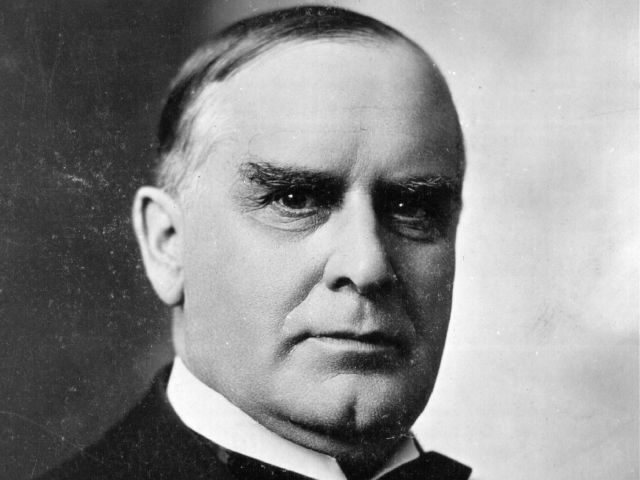“President McKinley was the leader and chief in a momentous period of his country’s history, and he rose fully to the great station. His policies have become the policies of the United States. When the history of his time is written he will stand forth as the great figure in the years that have been so crowded with events.”
—Sen. Henry Cabot Lodge, 1901
On August 30, President Barack Obama made an executive decision along with the Department of Interior to change the name of Alaska’s Mount McKinley to its Athabascan Indian name, “Denali.” In this unilateral decision made on his three-day trip to the “Last Frontier,” President Obama sidestepped Congress and put an end to the long-term name dispute over North America’s tallest mountain. Though some, like the curator of the McKinley Library & Museum in Canton, Ohio, are just “really excited that people are talking about McKinley on a national scale,” the removal of the 25th president’s name from the mountain is a blow to this deeply under-appreciated 19th century statesman. Many Americans—especially in McKinley’s birthplace of Ohio—are livid.
“This political stunt is insulting to all Ohioans, and I will be working with the House Committee on Natural Resources to determine what can be done to prevent this action,” said Rep. Bob Gibbs.
Ohio Senator Rob Portman said he believed Obama went “around Congress,” and added: “I now urge the administration to work with me to find alternative ways to preserve McKinley’s legacy somewhere else in the national park that once bore his name.”
The mountain was first named after McKinley by Alaska prospector William Dickey, who wrote an account of the massive peak’s impressive features for the New York Sun in 1896. According to the Washington Post, Dickey wrote that he named the mountain “after William McKinley of Ohio, who had been nominated for the presidency, and that fact was the first news we received on our way out of the wonderful wilderness.”
Mount McKinley’s sudden name change is not the first time the great Ohioan has received a sudden, shocking broadside.
On September 6, 1901 Republican President McKinley was shot by violent anarchist Leon F. Czolgosz at the Pan-American Exposition in Buffalo, New York. Thinking nothing of his own safety, the mortally wounded Civil War veteran spoke only about comforting his wife and asked that the assassin not be harmed. Several days later, the 25th president from Niles, Ohio died. The entire nation was grief-stricken for the last president to have served in the Union Army.
Mckinley’s presidency has been generally overshadowed by that of his successor, the more charismatic Theodore Roosevelt, but Mckinley was a highly respected and successful leader; he helped pull the country out a deep recession initiated by the financial panic of 1893, and ably led the nation in the Spanish-American War—a conflict he fought hard to prevent.
On top of the successful term in office, McKinley set in motion the policies that would become part of the Republican Party mantra throughout the 20th century. According to historian H.W. Brands in his book American Colossus, fellow Ohioan and right-hand man Mark Hanna promoted McKinley as the “advance agent of prosperity” in the 1896 presidential campaign against Democratic agrarian populist William Jennings Bryan.
McKinley believed strongly in the power of American industry and the importance of a strong currency backed by the gold. Though a strong tariff man for most of his life, McKinley’s last speech was a powerful defense of moving toward free trade and a more assertive American presence on the world stage.
In that final speech, McKinley said:
Isolation is no longer possible or desirable… Our capacity to produce has developed so enormously, and our products have so multiplied, that the problem of more markets requires our immediate and urgent attention… The period of exclusiveness is past… A policy of good will and friendly trade relations will prevent reprisals.
Mckinley believed that the combination of military might on the high seas and a vibrant economy no longer necessitated protection of infant industries. Though rarely recognized today, Mckinley had a powerful impact of the 20th century GOP, and he was a model for other presidents who have received more modern historical interest—like Calvin Coolidge and Warren G. Harding.
McKinley was the last president of the Age of Enterprise as the country moved into the Age of Progressivism. Like another great symbol of American capitalism—founding father Alexander Hamilton, who will be removed or diminished on the $10 bill according to Treasury Secretary Jack Lew—McKinley will be sadly and unceremoniously stricken from public notice. America is being fundamentally transformed, one landmark after another.
Follow Jarrett Stepman on Twitter:@JarrettStepman. Reach him directly at jstepman@breitbart.com.

COMMENTS
Please let us know if you're having issues with commenting.